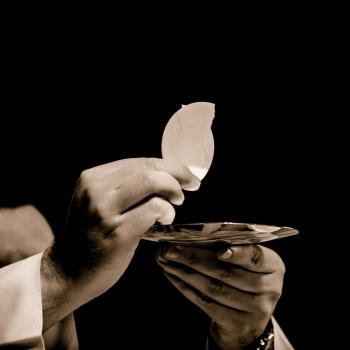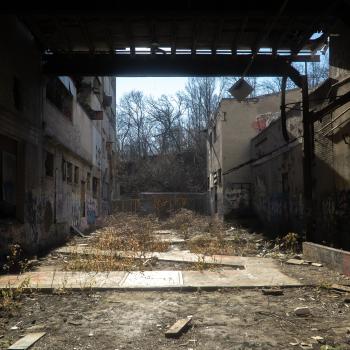Recently my own denomination has been roiled by debate over whether we should extend Communion (or the Eucharist) to the unbaptized. There has been a surprising amount of energy around the issue, and people have weighed in on both sides of the argument. Inevitably, there have been those who have appealed to the state of the world as a justification for setting aside the church’s theology, which restricts the Eucharist to those who are baptized. Others have made the same appeal arguing such concerns are simply trivial and ought to be set aside.
Having spent my life in the church and in the academy, I have felt the tug of current events – whether it has been war, civil rights abuses, rampant crime, shootings, spreading poverty, disintegrating families, or our fraying social fabric. When you spend years – not just days – on a research project or you prepare yet another sermon on the Resurrection with such events as a backdrop, anyone with a sense of compassion or moral responsibility is bound to wonder, “Does theology really matter?”
In such times, it is easy to believe that our priorities are misplaced, our energy misspent, and our reasoning based upon trivial considerations. Why not go along to get along, setting aside seemingly meaningless considerations or jettison the debates that engage us, all in the name of addressing more pressing matters?
As much as I sympathize with that line of reasoning, here are a few reasons that I believe that – even in the worst of times – especially, in the worst of times – theology still matters.
One: As Abraham Maslow’s hierarchy suggests, human beings need not only to survive, but to have reasons for surviving, something larger, more meaningful. Theology is inherently about meaning making and while it speaks to the importance of human life, the subject of our existence is, itself, tied to the larger significance of our lives as creatures made in the image of God.
Two: It is a false dichotomy to argue that we cannot or should not give our attention to anything but the exigencies of the moment. To be sure, we can and should attend to issues that threaten the survival and safety of others, but it is not enough to survive, and survival is often tied to issues of meaning making. It is also rare that we lack the time or the ability to attend to both concerns. So, suggesting that we must choose between the two is misleading.
Three: Each generation contributes to the world, not just for its own sake, but for the sake of generations to come. Confronting issues that might seem abstract or without relevance is inevitably a part of that process. It is not necessarily possible to see into our own futures, let alone the future of other generations. So, it is difficult to predict what will be “relevant” or “useful” at some, as yet unknown point in the future.
Four: The journey into God is a journey into the infinite. Theology is ultimately about defining that journey. It is about how we understand God, about God’s redemptive purposes, and about our obligations before God. As such, the theological task has its own value – for us and for those who follow us. To neglect that task is to fail in our responsibility to them.
Five: We take as much or as little knowledge of God into a crisis as we have already nurtured. Having worked for years with people grappling with loss and grief, it is painful to watch people grapple with distorted conceptions of God, prayer, and the ways in which God’s presence is manifested in the world. A piecemeal answer to those questions in one moment does not guarantee that people will be well prepared to face future crises. Being well prepared to face a crisis requires a larger undertaking, including the formation of our souls and our minds.
Finally, this needs to be said: We may think that we live in extraordinary times that require a new and different sense of urgency. But, in fact, that is not true. Our times are more dangerous than some, less dangerous than others. And our times, like every other period in human history, are lived out in the presence of God. There are, then, theological issues that demand our attention, regardless of the challenges that we face, because they impinge upon timeless and transcendent considerations. Talking not just about the theological task, but the larger challenge of teaching and learning, C.S. Lewis put it this way in a sermon delivered at the Church of Saint Mary the Virgin in Oxford, in 1939. He is worth quoting at length:
A University is a society for the pursuit of learning. As students, you will be expected to make yourselves, or to start making yourselves, into what the Middle Ages called clerks: into philosophers, scientists, scholars, critics, or historians. And at first sight this seems to be an odd thing to do during a great war. What is the use of beginning a task which we have so little chance of finishing? Or, even if we ourselves should happen not to be interrupted by death or military service, why should we — indeed how can we — continue to take an interest in these placid occupations when the lives of our friends and the liberties of Europe are in the balance? Is it not like fiddling while Rome burns? Now it seems to me that we shall not be able to answer these questions until we have put them by the side of certain other questions which every Christian ought to have asked himself in peace-time. I spoke just now of fiddling while Rome burns. But to a Christian the true tragedy of Nero must be not that he fiddles while the city was on fire but that he fiddles on the brink of hell. You must forgive me for the crude monosyllable. I know that many wiser and better Christians than I in these days do not like to mention heaven and hell even in a pulpit. I know, too, that nearly all the references to this subject in the New Testament come from a single source. But then that source is Our Lord Himself. People will tell you it is St. Paul, but that is untrue. These overwhelming doctrines are dominical. They are not really removable from the teaching of Christ or of His Church. If we do not believe them, our presence in this church is great tomfoolery. If we do, we must sometime overcome our spiritual prudery and mention them. The moment we do so we can see that every Christian who comes to a university must at all times face a question compared with which the questions raised by the war are relatively unimportant. He must ask himself how it is right, or even psychologically possible,for creatures who are every moment advancing either to heaven or to hell, to spend any fraction of the little time allowed them in this world on such comparative trivialities as literature or art, mathematics or biology. If human culture can stand up to that, it can stand up to anything. To admit that we can retain our interest in learning under the shadow of these eternal issues, but not under the shadow of a European war, would be to admit that our ears are closed to the voice of reason and very wide open to the voice of our nerves and our mass emotions. This indeed is the case with most of us: certainly with me. For that reason I think it important to try to see the present calamity in a true perspective, The war creates no absolutely new situation: it simply aggravates the permanent human situation so that we can no longer ignore it. Human life has always been lived on the edge of a precipice. Human culture has always had to exist under the shadow of something infinitely more important than itself. If men had postponed the search for knowledge and beauty until they were secure the search would never have begun. We are mistaken when we compare war with “normal life”. Life has never been normal. Even those periods which we think most tranquil, like the nineteenth century, turn out, on closer inspection, to be full of cries, alarms, difficulties, emergencies. Plausible reasons have never been lacking for putting off all merely cultural activities until some imminent danger has been averted or some crying injustice put right. But humanity long ago chose to neglect those plausible reasons. They wanted knowledge and beauty now, and would not wait for the suitable moment that never come. Periclean Athens leaves us not only the Parthenon but, significantly, the Funeral Oration. The insects have chosen a different line: they have sought first the material welfare and security of the hive, and presumable they have their reward. Men are different.They propound mathematical theorems in beleaguered cities, conduct metaphysical arguments in condemned cells, make jokes on scaffold, discuss, the last new poem while advancing to the walls of Quebec, and comb their hair at Thermopylae. This is not panache; it is our nature.
Photo by Roman Kraft on Unsplash















